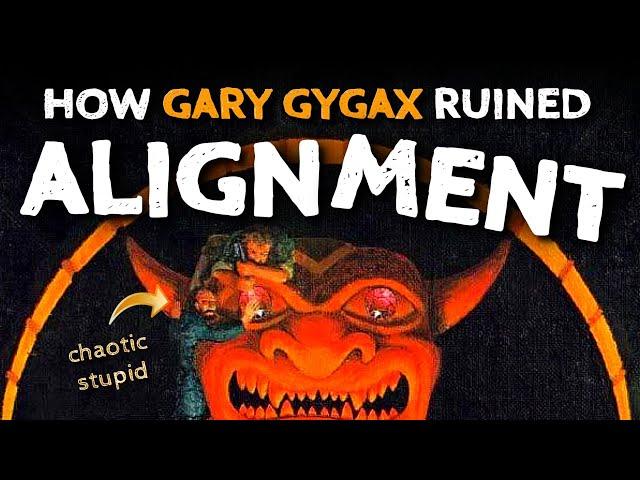Комментарии:

Thanks for taking Gary to task for one of his bad ideas. I'm lucky my Dad and my fellow players never wasted our time talking about alignment.
Ответить
Double standard thinking inevitably leads to evil behavior because you will base the standard on yourself thus placing others in the position of relatively disposable. Single standard thinking inevitably leads to good behavior because if there is one standard you want the best for yourself by wanting the best for others. Neutrals are pragmatic based on their reasons for choosing which kinds of standards to apply. But these are arrived at by different ways. Some (Chaotics) pick their single or double standard approach based on internal intuition. Others (lawfuls) accept a single or double standard approach from conformity to social pressure. Neutrals are motivated to their choice of good or evil by an ideology that is independent of both the individual and the social set. So true neutrals, for example, choose whether to apply fairness or unfairness (and the consequence good or evil) based on some ideology that takes higher priority and doesn't let either of those approaches be the sole voice. Such an ideology might be "maintaining the balance" for example.
Ответить
You skipped 2E where the alignments were clarified to be Good=/=Selfless, Evil=/=Selfishness, Law=/=Organization, and Chaos=/=Individuality. I wonder why you ignored that important set of rules. Maybe it's because you're under the mistaken belief that Gary had nothing to do with them. Well, Dragon 103 shows what was going to be in 2E by Gary before he was ousted. What he said he wanted was what we got.
Ответить
The alignment system is as antiquated as studded leather armor and Thaco. Bullshit nonsense that has plagued fantasy and pop culture for decades.
It's multiple steps away from real world philosophical and psychological motivators. It railroads character building, deters character arcs and progression or degression over the course of a campaign and limits imagination and compelling growth. Having a player write a sentence or two of their primary ethos makes things less murky in the long run while setting up more diverse and nuanced "compasses" to navigate.
What does your character's STRONGEST motivator?
What does your character's WORST trepidation?
What is your character willing to kill for?
What is your character willing to die for?

Class languages, even religion languages, make more sense. A regional language developed by trappers, based on a combination and range of their native languages, would facilitate quickly transferring relevant information in the wild. This could then have evolved into a language for Rangers - similar to Thieves' Cant.
Ответить
I dont like aligments, I dont really understand their function and Im just rolling characters how I think they would act based on circumstances and experiences. I always thought that rolling a chaotic evil character makes your chart so flacid since your personality traits just kind of become "haha arson". And the opposite side isnt much better with the "I smite the rogue for trying to sneak and steal the mcguffin. Its what my character would do".
I think that instead of aligment being a flat brick it could be a personality that twists and bends. Like a cutthroat assassin, still giving food and aid to the unfortunate- since thats where he grew up from. Or a judge jury executioner paladin, who stops evil right in its tracks with a swift swing of her sword- a loose cannon that smites first and asks questions later.

I think people get so held up over the "subjective" nature of how they perceive good and evil where it really just boils down to selfless vs selfish. And yeah, I also try to use alignment as more of a descriptor for how a character tends to act rather than a determiner for how they should act. I think the why vs how explanation you gave was helpful, too.
Ответить
Learning psychology makes Gygax's alignment make way more sense, most notably though, is that it makes sense as something that underlies the character's beliefs. Alignment being that inner part of a part that determines whether they can understand and connect with the values and ideals of "good" or if they can understand the world in terms like one villain puts it "morality is an illusion, there is only power." You could say it's all about mindset. A hero in the classic sense of someone that rushes in to save the day without even thinking about the consequences to themselves is a mindset that simply makes no sense to people of different mindsets (hence being labeled as lawful stupid by many). It is mindset that drives what core subjective beliefs someone will believe in. For example, a chaotic evil person has a mindset that leads them to see pursuit of self satisfaction as the only reasonable course of action (beyond survival of course) and would not understand why anyone do otherwise, which would seem stupid to them and thus must be explained by being taught wrong or mass delusion or cultural influence etc.
When you take all that subjective stuff and see alignment not as dealing with the subjective stuff but dealing with what is beneath that subjective stuff, it makes a lot more sense.
Not sure I've done a good job of explaining it.

I like how palladium handled "alignment" better. What a character would and wouldn't do.
Ответить
True neutral in 1E and 2E was very very weird, some likened it insanity, a character who runs back and forth trying to balance good and evil. There was a true neutral paladin in a a dragon magazine article called a paramander, who's job was the emulate and destroy LG paladins and anti-paladins (a CE paladin)
Ответить
Once again your informative video and soft and relaxed tone has earned you the nick name Cool Bobby. I encourage all your friends to address you as such.
Ответить
Alignment was a side in a war as d&d was originally a war game. Players needed a reason to nit kill the farmer for his gold because it grew out of a hobby where you only thought about the situation tactically. There was not really thought about if it was right to invade your neighbor, only that you could and could be successful at it. This is generally how the middle ages were because that is more or less how people thought about such things. Alignment was the first, "anti-murderhobo" rule.
There are a lot of games that use variations of it; morality in vampire, humanity in cyberpunk....

How could the creator break anything? Also, your understanding of alignment and its setting is poor. Yes, a L awful AND Good character in medieval times, would do exactly what Gary said. LAWFUL means they uphold the law! In that era, execution was expected! Gary wrote extensive explanations in Dragon over the years. The rulings are NOT your option on good and evil, but the era of the medieval world ethos of good, law, evil, and chaos. Lawful good, not lawful stupid. Go watch Gunsmoke. Marshal Dillion was the straightest Lawful Good I have ever seen in a character. Further, Gary INTENDED the hours of discuss over it in game, it's called ROLEPLAYING!
Ответить
I fundamentally disagree with your early arguments here. I think it's important to note that Gygax repeatedly wrote how alignment needs to be viewed from a medieval perspective, and how anachronistic and therefore...goofy it would be to bring modern philosophical conceits into the milieu. In other words, yes, it makes perfect sense that Lawful Good alignments would execute evil creatures gladly, because that's how the medieval mind worked. Knights Templar, Crusaders, Tang Dynasty officials, Aztecs judges and priests, shoguns and boyars, essentially ALL people with authority to decides others' fates would decide long ago, "are you MY kind of good? Great, then you're a human who deserves respect and kindness. Oh, you're NOT my kind of good? Then die MF'er, die". Remember, Zeus is Chaotic Good, Odin is Neutral Good, and so forth. Good essentially means, in D&D system, that whatever spreads the most weal for all is good. But, since Evil means the opposite, then aiding or even abiding evil by default is not spreading weal, so die evil MF'er, die.
Also, in no way, shape, or form is D&D oriented strongly towards good alignment. Lots and lots of players played Chaotic back in the day, and the thief class is described as often being Chaotic, (and essentially the example of a class that defines Chaotic). And for sure once 'real' D&D came around, 1st ed. Advanced, the option to play an evil character was supported throughout the books, modules make mention of how to judge the actions of evil aligned characters in the narrative arc, monsters of good alignment are there as foes for evil characters, and many, many NPCs in the milieu books are evil and clearly based on player characters or at least arch-typing the place and role of evil alignment in the game. I've personally played in countless campaigns with all evil or mixed alignment parties, and those games were fantastic. Not only is party conflict incredibly fun and exciting, but it's more immersive because it's more realistic, there's bastards everywhere! Finally, when you say 45 years of disagreements, I see those alignment discussions as a HUGE reason why D&D is so fantastic. It gets people thinking philosophically, which is always valuable, and also since it's clearly stated that the DM is the arbiter of how important alignment is in her campaign and what each alignment means for role-playing choices, the players get to experience a different ethos universe every time they play under a different DM. Sorry, almost everything you mention as a problem I see and have experienced with dozens of other players as features and benefits.
I have to also say, although it's frankly a very different topic, that all this modern-day talk of murder-hoboism and jerky players reveals more of a problem with younger generations than anything to do with the game, (although I'm not defending anything 3rd edition or newer, in my opinion, those games aren't even D&D really). It is extremely easy to deal with characters that disrupt the game with unrealistic choices and other jerky actions. Kill their characters repeatedly, (a barbarian NPC of high level overhears their jerky actions and walks over without warning and kills the character). And each time you punish their stupid behavior, tell them if they keep doing this sort of thing that they won't be invited to play anymore. That's it. Deal with it like an adult.
Gygax didn't ruin alignment, he invented a cool way to role-play moral and ethical perspectives. And it works just fine.

This take is flawed for two reasons. First of all alignment is the description of your characters moral and ethical outlook. At the end of the day your actions are informed by that, not the other way around. Second, alignments are not personalities, they don't define absolutely how you would act. They most they do is define the reasoning that you would not act upon. That's about it. Also the why aspect applies just as much to law and chaos as it does to morality, so that's not really a good definer.
Ответить
Yeah, while D&D has a lot of goofy crap in it, Gary is absolutely correct about that first one. This is exactly how people saw morality in medieval times. Don't forget, prisons are a modern invention, for most of the history criminals would have four options of punishment, depending on the crime: fine, corporal punishment, maiming and execution. Imprisonment was reserved for nobility that could be ransomed. I personally would add a requirement of formal trial before execution for a lawful character, but yeah, assuming you are playing in a medieval setting, it's entirely expected from a good character to hang a murderer he caught from a nearest tree.
That being said, it's fantasy, so it's up to you whether you want your setting to reflect historical reality. I'm just explaining where Gygax is (likely) coming from.

'Alignments' have always fascinated me.
Ответить
I'll just say my take on alignment, which is a very pragmatic one:
It makes zero sense. What is 'good' or 'evil' varies based on the person and the context, and blanket alignments are impossible to be accurate.
But, the Gods Of Justice And Light, or whatever 'good gods' exist... just fucken made it up as a way to justify their feuds with the other gods. Two paladins of different gods casting Detect Alignment on the same creature will possibly (and especially if those gods are at odds) get different results!
A divination wizard, who's power is more objective, who casts it, will merely get what their opinion on the matter would be, if they knew everything they needed to about the being
And magic items that base power on alignment? Depends on how the creator of the item would view your alignment! (or the item itself if its sentient)
Two paladins of warring gods who both view themselves as Lawful Good and the other as Neutral Evil can and should both use Smite Evil on each other!

Gygax's statement makes sense Given murder hobos.
Ответить
Alignment is much simpler for me if it comes from the Outer Planes. Chaos vs Law is the Blood War, now 5e canon. Pick a side, and you are lawful or chaotic. Respect life or don't, that's how you fight the war, and your choice makes you good or evil. No such thing as "chaotic good", it makes no sense because Chaos should be demonic and that is evil. Neutral is also stupid as a choice for sentient creatures. You can't be ok with the ends justifying the means only sometimes. It is the viewpoint of devils. Betray your alignment and the consequences should be mechanical, at least for paladins and clerics. Or else don't use alignment, it's too confusing and all but useless as a personal code of ethics and morality. In summary, I prefer a simplified system similar to 4e. LG, LE, U (non-sentients), C. That makes where you stand very clear. A LG character could rob from the rich and give to the poor, cause the gods don't care one way or the other. That's just how you spend your free time.
Ответить


























